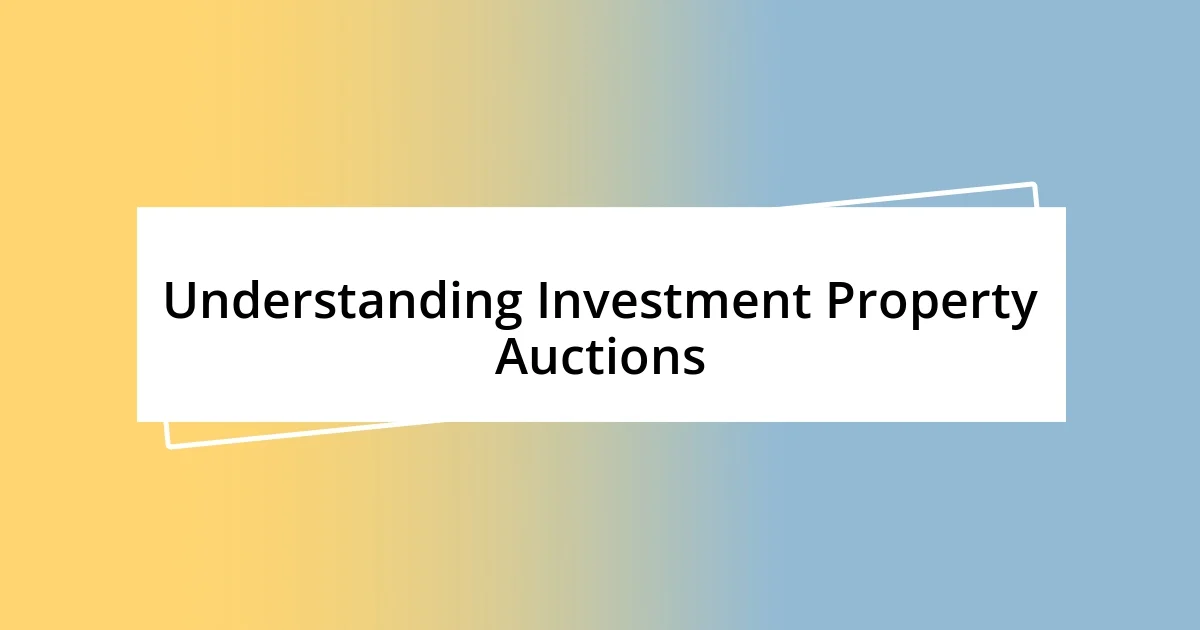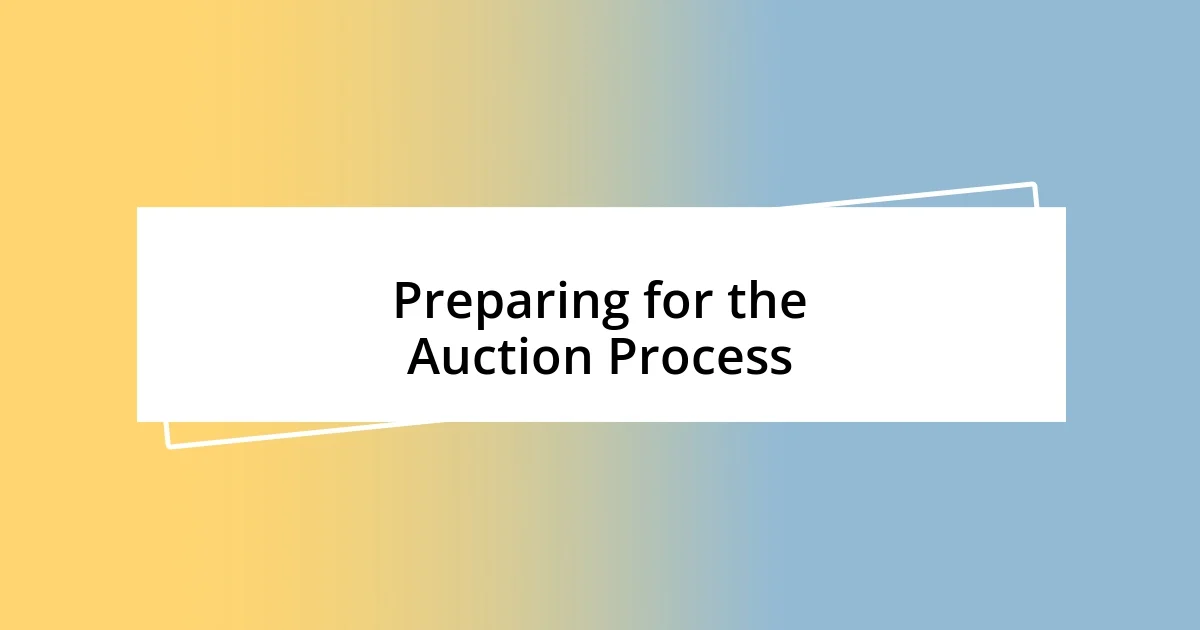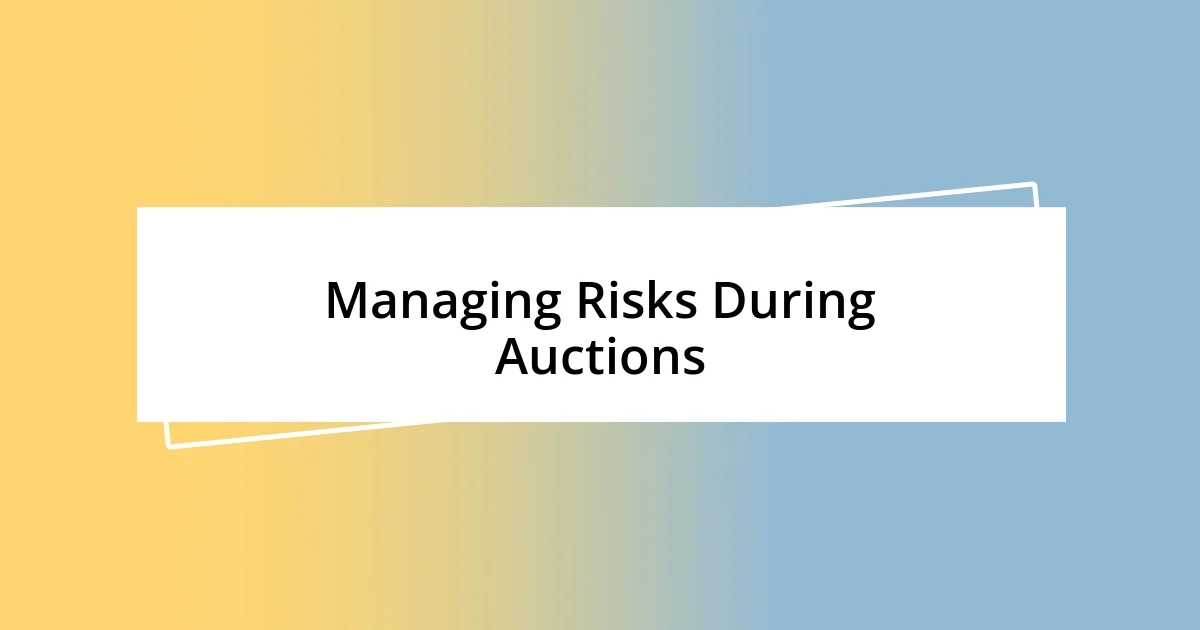Key takeaways:
- Thorough preparation and research, including property visits and understanding auction terms, empower bidders to manage the auction process effectively.
- Developing a disciplined bidding strategy that includes setting a maximum bid and being aware of emotional influences can prevent impulsive decisions during competitive moments.
- Post-auction evaluations, including reviewing paperwork and reflecting on the bidding experience, are crucial for improving future strategies and addressing emotional aspects of investment decisions.

Understanding Investment Property Auctions
Investment property auctions can be a thrilling yet daunting experience. I remember attending my first auction, feeling a mix of excitement and nerves coursing through me. The atmosphere was electric, filled with bidders eager to land their next investment. It made me wonder: what strategies could help me stand out amongst such fierce competition?
Understanding the bidding process is crucial. Each auction has its unique set of rules that dictate how bids are placed and when to place them. I once watched as a seasoned bidder calmly raised his paddle just at the right moment, securing a property I had my eye on. It taught me that timing and confidence are as important as money in this high-stakes game.
Additionally, doing thorough research ahead of time can make a significant difference. Before my next auction, I developed a checklist of properties I was interested in, analyzing their potential returns and market values. I found myself feeling more in control and less overwhelmed. Isn’t it empowering to enter an auction well-prepared?

Preparing for the Auction Process
Preparing for an auction can feel a bit like training for a big event. I remember spending countless hours poring over property listings, armed with my laptop and a cup of strong coffee. I found that familiarizing myself with the properties beforehand helped calm my nerves. It transformed the chaotic atmosphere of the auction into something I felt I could manage.
Here are some essential steps I recommend for preparing:
- Research Properties: Create a list of potential properties, focusing on their market value and comparable sales data.
- Visit Open Houses: Make time to physically check out properties. There’s something about stepping inside that can ignite your instincts.
- Set a Budget: Decide on a maximum bid to avoid the emotional pull of the bidding process tempting you to overspend.
- Review Auction Terms: Thoroughly understand the auction process, including any fees, deposits, and contingencies.
- Practice Bidding: If you’re new to auctions, practice your bidding strategy with friends or at mock auctions. It builds confidence.
By following these steps, you can turn the uncertainty of the auction process into a challenging yet exciting endeavor.

Researching Properties Before Bidding
When it comes to researching properties before bidding, I can’t stress enough how crucial it is to gather as much information as possible. I used to think a quick glance at listings would suffice, but after a few disappointing auctions, I realized that diving deep into property details was essential. For instance, examining recent sales in the area helped me identify fair market values, ensuring I wouldn’t overpay out of sheer excitement on auction day.
One of my favorite tactics was visiting open houses to get a genuine feel for the properties. There’s a unique energy in walking through a space and imagining the possibilities. I can recall standing in a particularly charming living room and picturing how tenants might occupy it. This kind of emotional connection not only fueled my enthusiasm but also guided my bidding strategy. It’s fascinating how often a property’s charm can influence decision-making and bidding behavior.
As I refined my research process, I created a spreadsheet to compare properties based on key factors like potential rental income, location advantages, and overall condition. This organized approach helped me feel more confident during auctions. I remember a time I came prepared with this data, and, as a result, I was able to bid strategically and snag a rental property I still own today. Isn’t it amazing how thorough research can transform an intimidating auction into an informed investment opportunity?
| Research Aspect | Importance |
|---|---|
| Market Value Analysis | Ensures you’re bidding within a fair price range. |
| Property Visits | Helps gauge emotional appeal and condition of the property. |
| Comparable Sales | Provides insight into similar properties and their selling prices. |
| Rental Potential Assessment | Evaluates possible income from the investment. |

Developing a Bidding Strategy
Developing a bidding strategy is not just about numbers; it’s about knowing myself and my limits. I’ve faced the temptation to jump in when the excitement escalates, and it often leads to regret. One auction day, I vividly remember watching the bids soar past my budget, and as thrilling as it felt, I had to remind myself: staying disciplined is key. Have you ever found yourself caught up in the moment only to realize later you’ve overshot?
I’ve personally found it helpful to break my strategy into clear, manageable steps. For instance, I would identify my absolute maximum bid based on thorough research and stick to it, no matter how enticing the property appeared. One time, I was in a bidding war over a stylish two-bedroom apartment. As the numbers climbed, I could feel the crowd’s energy, but I calmly recalled my limit and walked away. It was tough, but in hindsight, I appreciated the restraint—it led me to a better investment down the road.
Finally, I always consider the emotional aspects of bidding, too. My bidding strategy isn’t complete without anticipating how I might feel in the moment—anxiety, exhilaration, or even disappointment. By visualizing different scenarios and preparing my mindset, I find it easier to stay grounded. After all, isn’t it essential to balance emotions with logic when making significant investment decisions? The right strategy allows me to walk away with confidence, whether I win or lose.

Managing Risks During Auctions
Managing risks during auctions is an intricate part of the process that I’ve learned to navigate over time. One memory comes to mind—at my very first auction, I felt excitement bubbling inside me as the bids started flying. But then, I realized how quickly I could lose sight of my budget. To manage this risk, I began implementing a rule for myself: never bid without a clear stop-loss. This simple guideline helped me maintain perspective during high-pressure moments.
Another aspect of risk management is understanding the auctioneer’s style. I once attended an auction where the auctioneer had an engaging, fast-paced approach. At first, it felt exhilarating, but soon I found myself overwhelmed. It taught me the importance of staying calm and not getting swept away by the theatrics. Now, I always take a moment to observe the auctioneer and adapt my bidding approach accordingly. Have you ever noticed how different auctioneers can set the tone for the entire event?
Additionally, I’ve learned the value of having a backup plan. There was a particular auction where I was dead set on a property but had other options in mind just in case. As the bidding escalated, I felt a sense of relief knowing I had alternatives lined up. This foresight transformed my experience from one of desperation to one of strategic thinking. It’s incredible how preparing for the unexpected can shift your mindset and reduce anxiety on auction day.

Post-Auction Considerations
After the auction, my mind often races with thoughts about the next steps. One crucial consideration is the immediate inspection of the paperwork. I recall a time I hurriedly signed documents without thoroughly reviewing them, only to discover hidden fees later. Have you ever brushed off the fine print, thinking it wouldn’t matter? Trust me, taking a moment to read everything can save a lot of headaches down the road.
Another vital aspect is understanding the timeline for completing the transaction. I remember being caught off guard by the swift deadlines following one auction. The pressure of securing financing and conducting due diligence within such a tight schedule was overwhelming. It’s essential to plan ahead and assemble your team—whether that’s a good real estate lawyer or a trusted financial advisor—so you can move quickly and effectively. Have you prepared your support network in advance?
Lastly, I always evaluate my emotional state post-auction. Winning a property can feel exhilarating, but there’s also the anxiety of what lies ahead. I’ll never forget feeling both thrilled and apprehensive after my first successful bid. It taught me that reflection is crucial; assessing whether I made the right choice helps to keep me grounded. How do you process the highs and lows after a significant investment? Recognizing your feelings can help shape your strategy for future auctions.

Lessons Learned from My Experience
One of the biggest lessons I’ve learned from attending investment property auctions is to manage my expectations. I vividly recall a time when I went in with my heart set on a stunning property, thinking that my enthusiasm would be enough to secure it. As the bidding heated up, I saw my hopes dashed when the price soared beyond my limit. Have you ever felt that sharp pang of disappointment in a moment like that? It taught me the importance of balancing enthusiasm with realism to ensure I remain level-headed during the auction process.
Another key takeaway is the art of building connections. At one auction, I struck up a conversation with a fellow bidder who turned out to be quite knowledgeable about the local market. We exchanged insights, and his perspective helped me understand the property’s true value. Have you considered how networking can enhance your auction experience? Cultivating relationships within the industry not only enriches your knowledge but can also lead to potential partnerships or advantages in future bids.
Lastly, I’ve realized the significance of post-bid reflections. After winning a property, I remember the joy morphing into an array of concerns—did I pay too much? Was I too impulsive? The rollercoaster of emotions made me appreciate the need for a debriefing moment. By allowing myself to process the entire event, I learned to identify my strengths and weaknesses as a bidder. Why not take time to evaluate your experiences? This reflection can be a game-changer for shaping your future strategies.














